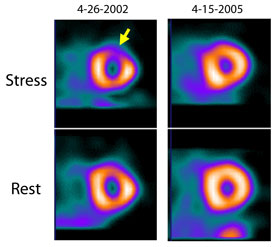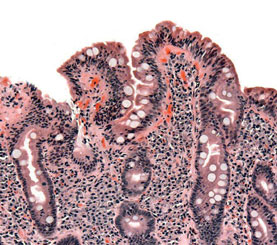Digoxin, Biosite Triage Cardiac Panel, insulin pumps recalled
A summary of approvals, recalls, warnings and alerts digested by ACP Internist from the Food and Drug Administration's alerts.
Recalls, warnings and label changes
A recall of all tablets of Caraco brand Digoxin, USP, 0.25 mg, distributed before March 31, 2009, which are not expired and are within the expiration date of August, 2011, because they may differ in size and thus could have more or less digoxin than indicated. Digoxin toxicity can cause nausea, vomiting, dizziness, low blood pressure, cardiac instability, slow heart rate and death. A lower-than-labeled dose may pose a risk of heart failure and abnormal heart rhythms.

A Class 1 recall of lot #W44467B of Biosite brand Triage Cardiac Panel because it may yield false-negative results with patient samples containing troponin I at very low levels, with CK-MB, and with myoglobin. A false negative would indicate a person has not had a heart attack or heart muscle injury when in fact he or she has. The affected lot, Catalog No. 97000HS, was shipped as 25 individually pouched devices per kit box, and was distributed from Jan. 24 through Feb. 17, 2009.
A recall of ACCU-CHEK Spirit insulin pumps with “up” and/or “down” buttons that don't work. The buttons are used for changing the program in the menu or administering additional insulin. If they don't work, users may not be able to change any programmed setting on the pump. The recall applies to pumps with serial numbers from SN02119552 through SN10006093. Pumps with serial numbers including and above SN10006094 aren't being recalled.
A boxed warning for topical testosterone gels AndroGel 1% and Testim 1%, due to reports of adverse effects in children who were inadvertently exposed to testosterone through contact with a person using these products. Events included inappropriate enlargement of the genitalia (penis or clitoris), premature development of pubic hair, advanced bone age, increased libido and aggressive behavior.
An alert about the risk of serious liver injury, including death and liver failure, with the use of propylthiouracil (PTU) in adult and pediatric patients. It appears there is an increased risk of hepatotoxicity with PTU as compared to methimazole (MMI). Physicians should closely monitor patients on PTU therapy for symptoms and signs of liver injury, especially in the first six months.
An updated label and patient medication guide for all antiepileptic drugs to warn about the risk of suicidal thoughts and actions. The drugs are used to treat epilepsy, psychiatric disorders, and other conditions like migraines. Providers should monitor patients taking or starting these antiepileptics for changes that could suggest suicidal thoughts or behavior or depression.
A warning to consumers to stop using Hydroxycut dietary supplements due to a risk of serious liver injuries. Reports of health problems associated with the products include jaundice and elevated liver enzymes, liver damage requiring transplant, and death from liver failure. Others include seizures, cardiovascular disorders and rhabdomyolysis.
A label update for erlotinib (Tarceva) to warn of reports of gastrointestinal perforation (including fatalities); bullous, blistering and exfoliative skin conditions including cases suggestive of Stevens-Johnson syndrome/toxic epidermal necrolysis; and ocular disorders, including corneal perforation or ulceration.
A reminder about the risk of serious fungal infections associated with TNF-alpha blockers like golimumab (Simponi). Histoplasmosis and other invasive fungal infections are not consistently recognized in patients taking TNF-alpha blockers including certolizumab pegol (Cimzia), etanercept (Enbrel), adalimumab (Humira) and infliximab (Remicade).
Approvals
A combination of amlodipine, valsartan, hydrochlorothiazide (Exforge HCT), the only hypertension treatment to combine three medications in one pill.
Tolvaptan (Samsca) to treat hyponatremia associated with congestive heart failure, liver cirrhosis and the syndrome of inappropriate antidiuretic hormone secretion. A boxed warning will say that the drug should be started only in a hospital where blood sodium can be monitored closely, because too rapid a rise in sodium can cause osmotic demyelination syndrome (ODS).





